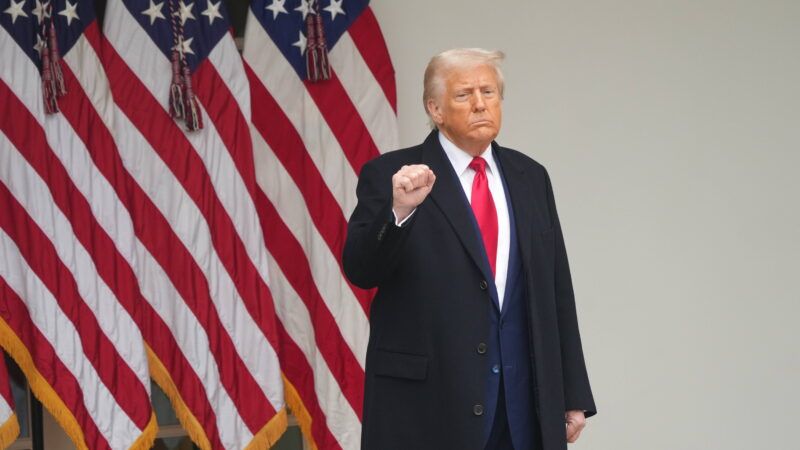Trump Is Giving Everyone What They Want In the Dumbest Way Possible
Dynamists, protectionists, hawks, and doves are seeing their policy goals realized in the most bungling and incompetent fashion imaginable.

A range of factions with mutually exclusive policy goals entered the Trump White House hoping the president would prioritize their particular political project.
Dynamists want to cut regulation and unleash economic growth. Many different stripes of protectionists want to end past decades' regime of global free-ish trade. Foreign policy restrainers want to get us out of overseas conflicts. Foreign policy hawks want to start some more.
It's a credit to President Donald Trump's slapdash style and personal charisma that he managed to convince every camp of this heterogeneous coalition that they'd get what they wanted from his second term.
More incredibly, he's making everyone's dreams come true. The only catch is that he's doing it in the dumbest way possible.
This past Wednesday was "Liberation Day," when the president announced a sweeping regime of bilateral "reciprocal tariffs" on almost every country in the world.
People who wanted tariffs certainly got them, but the details belie any coherent logic behind the scheme.
It's hard to claim these tariffs are being done to counter Chinese influence (as some in the Trump administration want to use tariff policy to do) if China's 32 percent tariff rate is roughly equivalent to Taiwan's 32 percent and less than Chinese rival Vietnam's 46 percent.
Nor can one claim that these tariffs are about fair trade, whereby we only have free trade with countries that have free trade with us, given the formula the administration is using to calculate the "reciprocal" tariffs. The White House is simply dividing our trade deficit with each country by their imports to us.
Arch-tariff defender Oren Cass has heroically attempted to defend these tariff rates by arguing that trade deficits by themselves are a good proxy for unbalanced trade policies.
Yet even Cass has conceded that under a balanced system of trade, the U.S. would run trade surpluses with some countries and deficits with others. It's for this reason that he favors a single global tariff rate.
"Setting tariffs country-by-country, and re-evaluating each with some regularity, will create a lobbying bonanza and inevitable misfires and distortions," wrote Cass back in February.
Cass seems willing to accept Wednesday's system of bilateral tariffs as a second-best option. Even here, though, one wonders why the Trump administration decided to tariff uninhabited islands and individual French administrative regions with no independent trade policy of their own.
At some point, even the protectionists are going to have to admit that none of this makes any sense.
Before libertarian free traders get too haughty, it's worth remembering that we've already gone through this with the Department of Government Efficiency (DOGE).
Trump isn't a small-government guy. But on the campaign trail he did promise state-shrinkers that he'd launch a DOGE effort to slash federal workers, regulation, and spending.
His first few months in office have been dominated by stories of the Elon Musk-led DOGE firing thousands of federal workers, canceling grants, and even shuttering whole agencies.
It's hard not to get excited by the energetic effort. I've argued before that even a very crude and legally dubious arsonists' blitz through federal departments has a sunny side.
But when one looks at the details of DOGE's fruits, you can't argue that it's been well-thought-out.
Billions in claimed savings have been subsequently reduced to millions. Thousands of cut workers have been ordered back to the office, either by courts or by the administration's own backtracking.
DOGE's promise that rooting out fraud, waste, and abuse would balance the budget was always illusory. Seemingly no effort has been made to work with Congress on more lasting and permanent spending recissions and regulatory repeals.
All things considered, a haphazard DOGE effort is preferable to the Biden administration's "whole-of-government" efforts to expand regulations wherever possible.
Libertarians have nevertheless managed to find themselves in the same boat as protectionists—watching an administration very ineptly pursue their generational political project.
The list of factions in the same position goes on.
Those who wanted to see the Trump administration stand by Israel and crack down on domestic opposition to it have had to watch its bungled, likely unconstitutional effort to eject a non-criminal legal permanent resident for his speech alone.
The hawks that wanted to see Trump take on Iran and its allies are no doubt disappointed they weren't invited to the Signal group chat about military strikes on the Houthis—even though a liberal journalist was.
Foreign policy restrainers that want us to extricate ourselves from the war in Ukraine on the grounds that it's really not our business have been rewarded with a bizarre "mineral deal" that keeps us more involved in that conflict.
Nativists who wanted mass deportations are, for the moment, having to settle for more targeted evictions of valid asylum seekers with the wrong tattoos.
Only MAGA true believers can actually claim to be satisfied. They voted to see a double-proof Trump show, and the president has delivered with his characteristic flair.
The most common way politicians disappoint you is by saying they'll do the thing you want and then doing the opposite. There's been plenty of that during the Trump administration for sure.
In large part, however, Trump has failed in a more unusual way: doing what his supporters want in the most haphazard and incompetent way possible.
Those disappointed by the results might continue to console themselves by saying it's better than what the alternative would have been. At a minimum, everyone should hopefully be able to admit by now that there's no 4-D chess being played.
Rent Free is a weekly newsletter from Christian Britschgi on urbanism and the fight for less regulation, more housing, more property rights, and more freedom in America's cities.


Show Comments (100)